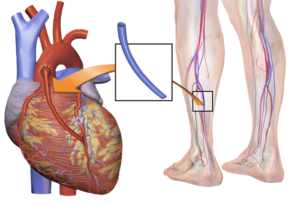
Abdominal pain after coronary bypass surgery can be mild or considerable, and make the patient think something is wrong.
Pain can be frightening, especially after coronary bypass surgery (also known as CABG).
“This is an extremely common problem which in the vast majority of cases is benign and self-limiting,” says Dr. Michael Fiocco, Chief of Open Heart Surgery at Union Memorial Hospital in Baltimore, Maryland, one of the nation’s top 50 heart hospitals.
So then, what are some causes of post-op pain with coronary bypass surgery?
Dr. Fiocco continues: “The most common causes are pain from the drains which exit the body in the upper abdomen, causing some pain and occasional muscle spasm and constipation.
“The discomfort from the drains subsides when the drains are removed 48 hours after surgery.
“Constipation is usually resolved before discharge, but may linger depending on the patient’s level of activity and their use of narcotic pain medicine.
“More narcotics, less activity, means more constipation. These common causes of abdominal pain rarely last for more than a few days and the pain is usually quite mild.”
But if the pain is more than mild, say, approaching a 7 or 8 on the hospital’s pain scale, where a rating of 10 means the worst pain you can imagine, this may reflect:
Simply the patient’s general physical condition (is the patient older, out of shape?)
The patient’s natural tolerance for pain
And if other issues are going on with the patient, such as clinical depression (primary or secondary), which can amplify perception of pain, and abdominal pain from coronary bypass surgery is no exception to this amplification.
There can also be more serious, though much rarer, causes of abdominal pain following CABG.

CABG. Source: Blausen Medical Communications, Inc.
Dr. Fiocco explains, “More concerning and fortunately very rare is pain from pancreatitis, bowel distention, and peptic ulcer disease. These disorders require longer stays in the hospital and close observation.”
What would be the course of treatment in the event of these complications following CABG?
“CT scans, upper and/or lower endoscopy, and frequent blood tests are needed to diagnose and treat these problems,” says Dr. Fiocco.
“They are rarely life threatening, but may be quite debilitating for several weeks.”
Can abdominal pain following coronary bypass surgery ever mean a life threatening situation?

Shutterstock/George Rudy
“The most unusual cause of abdominal pain, but the most dangerous, is ischemic bowel, or loss of blood supply to the bowel,” says Dr. Fiocco.
“This occurs secondary to a clot or piece of plaque flowing downstream to the arteries of the intestine, similar to how a stroke affects the brain.
“This may require emergency surgery in its most severe form.
“The most important message for patients is that abdominal pain may occur after CABG, but is almost always self-limiting, mild and benign.”

Dr. Fiocco specializes in treating artery disease, valvular disease and aortic aneurysm. His heart care expertise has earned him recognition by Baltimore Magazine as a Top Doctor in 2010, 2011, 2013, 2016 and 2017.
 Lorra Garrick has been covering medical, fitness and cybersecurity topics for many years, having written thousands of articles for print magazines and websites, including as a ghostwriter. She’s also a former ACE-certified personal trainer.
Lorra Garrick has been covering medical, fitness and cybersecurity topics for many years, having written thousands of articles for print magazines and websites, including as a ghostwriter. She’s also a former ACE-certified personal trainer.
.













